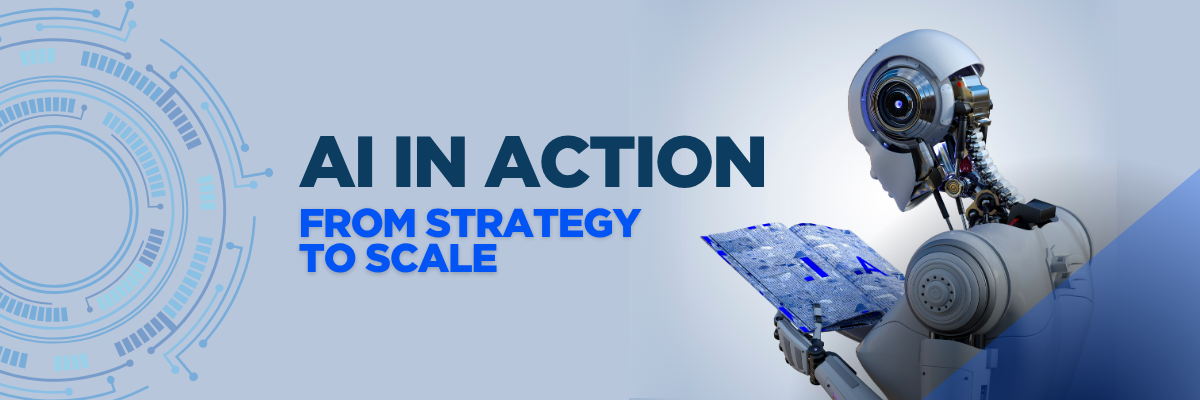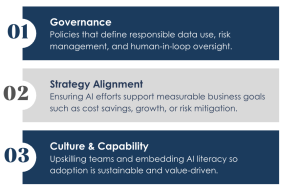

In 2025, Artificial Intelligence has moved beyond hype. It is no longer a playground for pilots or experiments; it has become the backbone of competitive advantage for companies that treat it as a strategic muscle, not a side project.
Yet, for every organization scaling AI successfully, dozens remain stuck in pilot purgatory. The reason is rarely technology. More often, it is the absence of clear strategy, governance, and accountability.
At Acuvity Consulting, we have seen a clear pattern emerge across industries: the companies that generate real impact with AI are those that anchor it in business strategy, govern it responsibly, and align it with culture and execution.
AI initiatives often fail not because of poor models, but because of weak foundations. Without clear ownership, accountability, and cross-functional governance, even the most advanced algorithms stall.
A strategic AI foundation includes:

Together, these create a compass that helps leaders navigate responsibly while balancing innovation with integrity.
Before diving into real-world use cases, it is worth acknowledging the most common pitfalls organizations face when scaling AI:
Avoiding these pitfalls requires a structured roadmap that connects readiness, governance, and opportunity.
Below are twelve pragmatic, high-impact use cases that show how organizations across manufacturing, life sciences, high tech, and financial services are realizing the promise of AI when strategy and governance are built in from the start.
Challenge:
Unplanned downtime can cost millions each year. Most factories rely on scheduled maintenance or reactive repair, both of which lead to inefficiencies.
Solution:
AI models analyze sensor data to predict equipment failures before they happen. When paired with agentic AI, these systems can automatically trigger maintenance orders, schedule repairs, and reroute production to minimize disruption.
Impact:
Manufacturers like Festo have saved over $16,000 per machine annually and achieved ROI in under a year. Siemens reports measurable drops in downtime with predictive models.
Read more here and here.
Tools Used:
AWS Lookout for Equipment, IBM Maximo Predict, Databricks MLflow, TensorFlow.
More insights
Challenge:
Manual inspections are slow and inconsistent, especially for products with variable shapes or materials.
Solution:
Computer vision models inspect products in real time, identifying defects faster than human operators. With agentic capabilities, these systems can halt production, alert teams, and adjust process parameters on their own.
Impact:
Early adopters report up to 90% faster defect detection and up to 40% lower defect rates.
Case study examples
Tools Used:
NVIDIA Metropolis, Google Vertex AI Vision, Siemens MindSphere.
Related reading
Challenge:
Disruptions, volatile demand, and manual forecasting tools lead to excess inventory or stockouts.
Solution:
AI models integrate sales, supplier, and logistics data to improve demand forecasting. Agentic AI can autonomously reorder materials, shift production, or reroute shipments in response to real-time conditions.
Impact:
Firms have achieved up to 25% lower inventory costs and improved on-time delivery by 10%.
Supporting research
Tools Used:
Kinaxis RapidResponse, SAP IBP, Palantir Foundry, Databricks Delta Live Tables.
Challenge:
Drug discovery can take a decade or more, with billions in R&D costs and high failure rates.
Solution:
Generative AI models simulate and propose new molecules with predicted binding affinities. Agentic AI platforms can autonomously prioritize compounds for lab validation and refine them through iterative cycles.
Impact:
Studies show 30–50% faster discovery cycles and up to triple the number of viable leads.
Learn more
Tools Used:
NVIDIA BioNeMo, Schrödinger AI Suite, DeepMind AlphaFold.
Technical reference
Challenge:
Clinical trials face delays due to slow patient recruitment and poor site selection.
Solution:
AI analyzes electronic health records and genomic data to identify optimal sites and patient pools. Agentic systems can monitor recruitment in real time and adjust inclusion criteria or resource allocation.
Impact:
Companies using these tools have seen 20–30% faster enrollment and fewer protocol changes.
Supporting analysis
Tools Used:
Medidata AI, IQVIA Orchestrated Trials, AWS HealthLake, SAS Analytics Framework.
Challenge:
Monitoring adverse events across reports and social media is time-consuming and error-prone.
Solution:
NLP models extract and classify adverse event signals from unstructured data. Agentic AI systems can automatically triage and draft reports for regulatory submission.
Impact:
Pharma firms are achieving 50–60% faster safety reporting and improved compliance accuracy.
Detailed overview
Tools Used:
Google Cloud Healthcare NLP API, Linguamatics IQ, VigiBase APIs.
Challenge:
Software teams face tighter release cycles and growing test workloads.
Solution:
Generative AI assists in writing and reviewing code, while agentic systems can run automated regression tests, deploy patches, and roll back failed builds.
Impact:
Developers report 30–40% faster release cycles and fewer production bugs.
Supporting article
Tools Used:
GitHub Copilot, OpenAI GPT-5 API, Databricks Model Serving.
Challenge:
Microscopic process variations can cause significant wafer yield losses.
Solution:
AI models detect correlations between design and yield data, predicting and correcting defects earlier in the process. Agentic AI can fine-tune fabrication parameters automatically.
Impact:
Manufacturers report 5–10% yield improvements per wafer, saving millions in scrap.
Technical context
Tools Used:
Cadence Cerebrus, Synopsys DSO.ai, NVIDIA Clara.
Challenge:
Tech firms spend heavily on large support teams to manage repetitive customer issues.
Solution:
Agentic conversational AI tools handle customer queries and execute tasks such as password resets or refund requests.
Impact:
Companies have achieved up to 40% lower support costs and faster ticket resolution.
Learn more
Tools Used:
Aisera AI Service Desk, Forethought SupportGPT, Twilio Flex.
Challenge:
Fraudsters evolve faster than legacy rule-based systems can adapt.
Solution:
Graph-based ML and anomaly detection identify suspicious transaction patterns. Agentic AI can freeze accounts and escalate only verified cases to compliance teams.
Impact:
Banks see up to 50% faster detection and 20% fewer false positives.
McKinsey report
Citigroup insight
Tools Used:
Feedzai, Palantir Gotham, AWS Fraud Detector.
Challenge:
Traditional scoring models lack flexibility for customers with thin credit histories.
Solution:
AI models use behavioral and transactional data to build dynamic, explainable risk scores. Agentic systems can adjust credit limits or offer personalized products in real time.
Impact:
Banks achieve 25% faster underwriting and improved default prediction.
Reference guide
Tools Used:
Zest AI, Experian Ascend, FICO AI Platform.
Challenge:
Processing KYC and compliance documents consumes thousands of staff hours each month.
Solution:
OCR and LLM-based systems extract, validate, and summarize regulatory documents automatically.
Impact:
Banks report 60–80% faster processing and significant cost savings.
See more examples
Tools Used:
Google Cloud Document AI, UiPath Document Understanding, WorkFusion.
Across sectors, the organizations leading in 2025 are not those experimenting with AI but those institutionalizing it. Agentic AI represents the next leap forward, where systems can not only analyze but also act responsibly within governance frameworks.
The real question is no longer “Can we use AI?” but “Can we scale it, govern it, and make it part of our strategic core?”
To help organizations answer that question, Acuvity Consulting has developed AI Compass™, a structured diagnostic and roadmap framework that guides enterprises from experimentation to impact.
AI Compass™ helps leaders:
With AI Compass™, your organization gains the structure and confidence to move from pilot projects to enterprise-wide transformation.
📍 Earlier this week, we launched AI Compass™ — a practical framework for scaling AI responsibly. Contact us at info@acuvity.com to explore how it can help your organization turn AI ambition into real impact.
If your company is ready to move beyond pilots and into scalable value, connect with us at www.acuvity.com/contact to start your AI transformation journey.

Venkat Avasarala Dec 26, 2025

Venkat Avasarala Nov 28, 2025

Venkat Avasarala Oct 31, 2025
